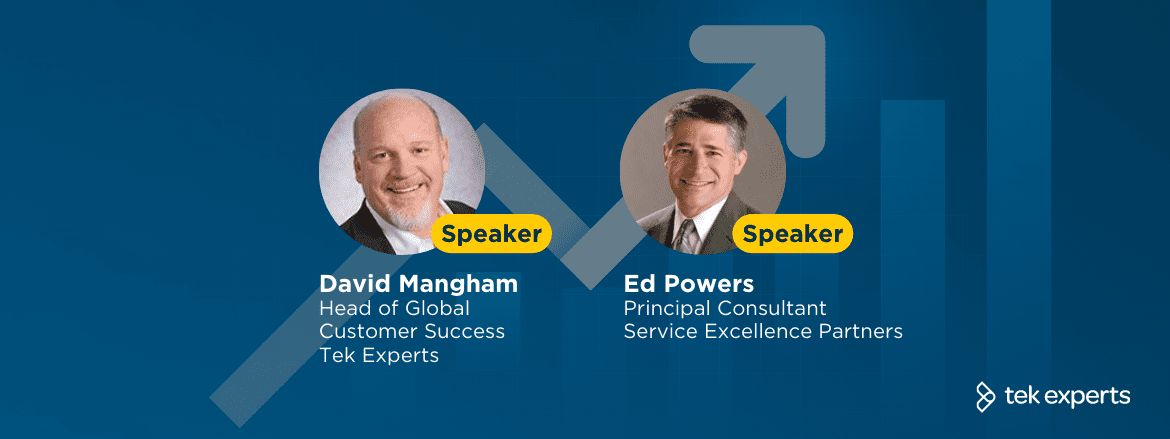Customer success leaders are turning to automation and AI as they try to cut costs in response to this uncertain economy. Unfortunately, by reducing human-to-human collaboration, businesses could be missing out on key opportunities for revenue growth.
So, what’s a cost-effective solution for increasing revenue through customer success, despite a lack of resources and an unstable economy?
Tek Experts spoke at TSIA World Interact 2023 in Orlando about the importance of customer success teams maintaining a human connection with their customers. Attendees learned how to cost effectively provide human touch at scale to help customers in all tiers realize the value of their products and services. Plus, they were shown real life results of how this tactic has been successful with customer success teams at Tek Experts in Rwanda.
Read 5 key takeaways below that were shared in this session by David Mangham, Head of Global Customer Success at Tek Experts, and Ed Powers, Top 25 Customer Success Influencer and Consultant at Service Excellence Partners.
1. Mid-tier customers need engagement, too
Your current customers are your greatest source of potential revenue, but many of them get ignored due to lack of resources and leaders trying to do more with less. Most businesses receive a majority of their revenue and growth potential from a very small number of top tier accounts. These accounts are given the most attention – and rightly so.
Unfortunately, leaders don’t have the resources to provide that same level of engagement to smaller tier 2 and 3 customers. This results in leaders turning to automation to cost effectively engage those segments of customers at scale.
While this can be effective to an extent, in certain cases it can lead to a lack of engagement, renewals, and upsell opportunities, and although they’re smaller, these losses can add up to a large deficit in revenue over time.
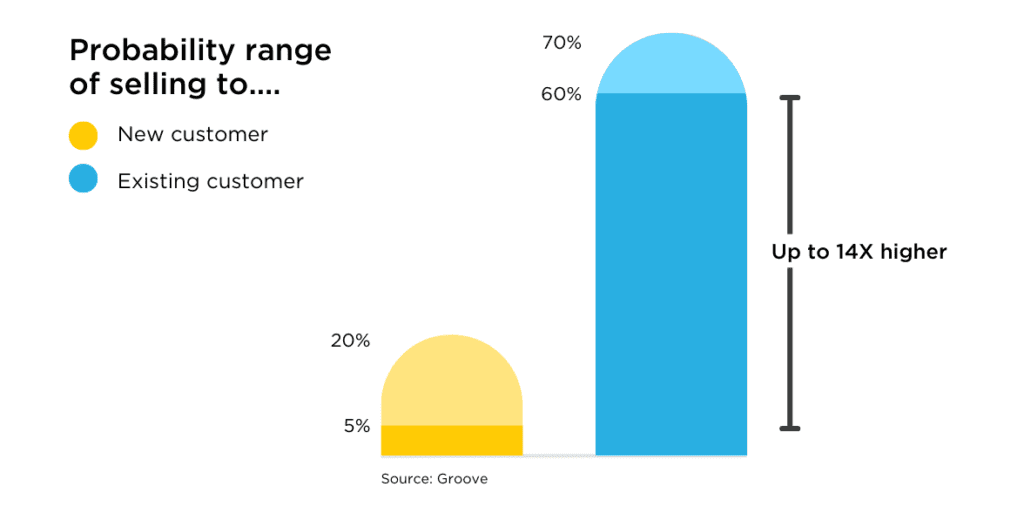
So how can businesses ensure quality customer engagement across all segments without spreading their resources too thin?
2. A customer success partner produces outcomes at scale
When you partner with a managed services provider to support your internal customer success teams, you can reach 350 accounts for the same cost it would be to cover 50 accounts internally, all while maintaining a human connection.
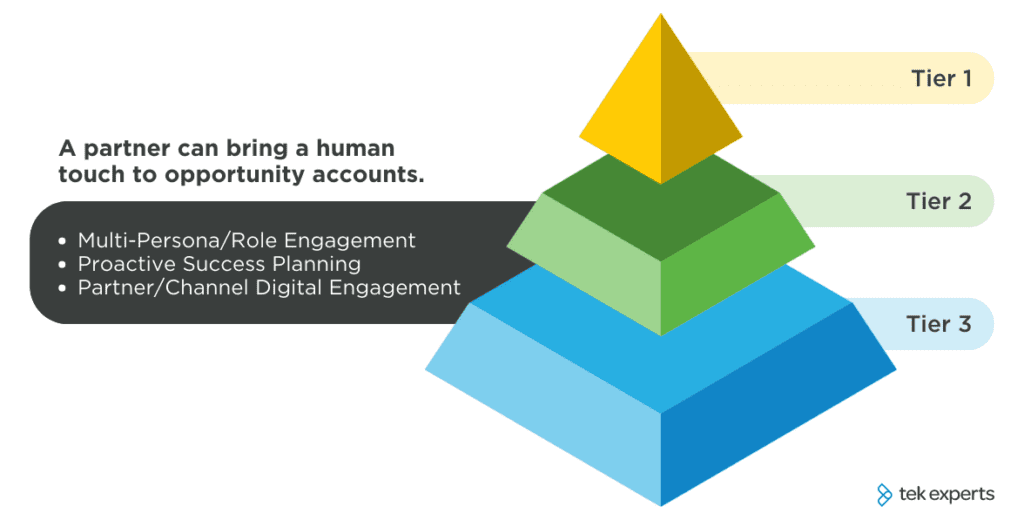
Not only are you able to cover more accounts, but you’re able to reach those customers more effectively. A partner provides you with talent in the regions you’re serving, so they can more easily communicate with your customers due to similar time zones and language capabilities.
Additionally, a partner has expertise from working with other clients, enabling them to provide best practices and ensure high quality outcomes for your business. An effective partner performs as an extension of your internal teams, providing brand consistency throughout customer engagements and instilling confidence in the brand from the beginning.
“What starts right stays right. We cannot overstate the importance of doing things right from the beginning.”
– Ed Powers, Consultant at Service Excellence Partners
3. Effective onboarding is crucial for customer success
First impressions matter. Most customers decide whether to renew within the first 90 days of using a product or service. This means onboarding and performing a risk assessment early on is crucial to customer success.
To ensure brand loyalty and growth potential, your business must build a strong relationship with your customers from the start, developing a deep understanding of their needs and goals to help them realize the full value of their purchases and other relevant offerings. This relationship and understanding of customer needs can be difficult to develop through a technology-based customer success strategy, but it’s crucial for driving revenue, hence the importance of maintaining a human connection with all customer tiers.
4. Successfully scaling customer success with outsourcing
In 2022, an enterprise software company couldn’t afford to staff a customer success team that was able to build meaningful relationships with customers outside of their top tier. Tek Experts stepped in to expand their customer success team and delivered impressive results.
The Tek Experts team had a 96% customer satisfaction rating and delivered over 1,500 new onboardings for customers, which as mentioned earlier, is a critical step for laying down a good foundation for customer relationships.
The team was able to build strong, human relationships with the client’s mid-tier customers, generating an additional $60 million in revenue. This resulted in a 10X return on investment.
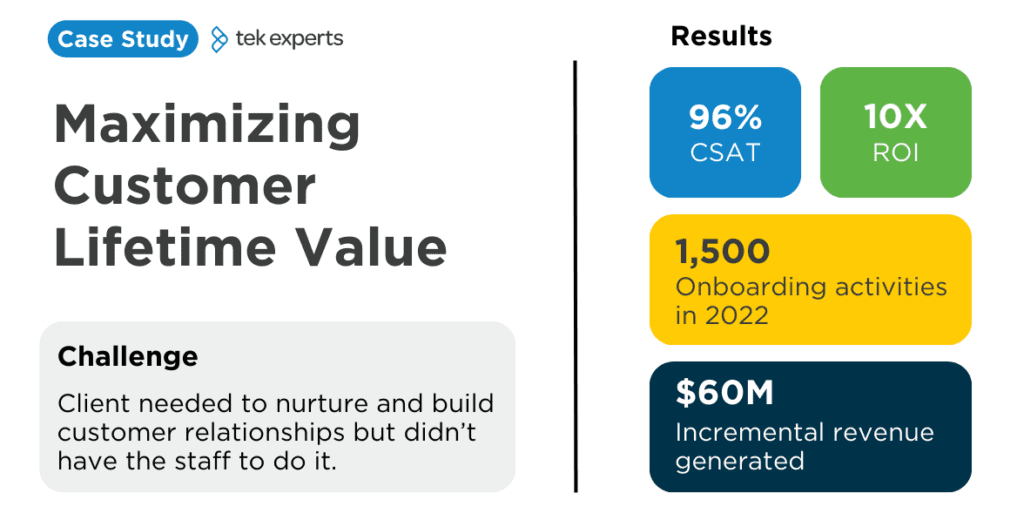
“The financials are there – you just have to look at customer success from a different perspective. Humans matter and you can do it in a cost-effective way.”
– David Mangham, Head of Global Customer Success at Tek Experts
5. When to outsource customer success
Partnering with a managed services provider for customer success is not the answer for everyone, but it could be for you.
Outsourcing customer success is best for businesses with high complexity or minimal solution automation and the need to reach mid to low customer segments.
Those high complex solutions require a human touch to better understand and support complex customer needs, and since many organizations can’t afford internal teams to build relationships with lower segment customers, outsourcing is a great alternative solution. By having a partner focus on mid and low tier customers, your internal teams can focus on your larger customer segments without losing valuable revenue.
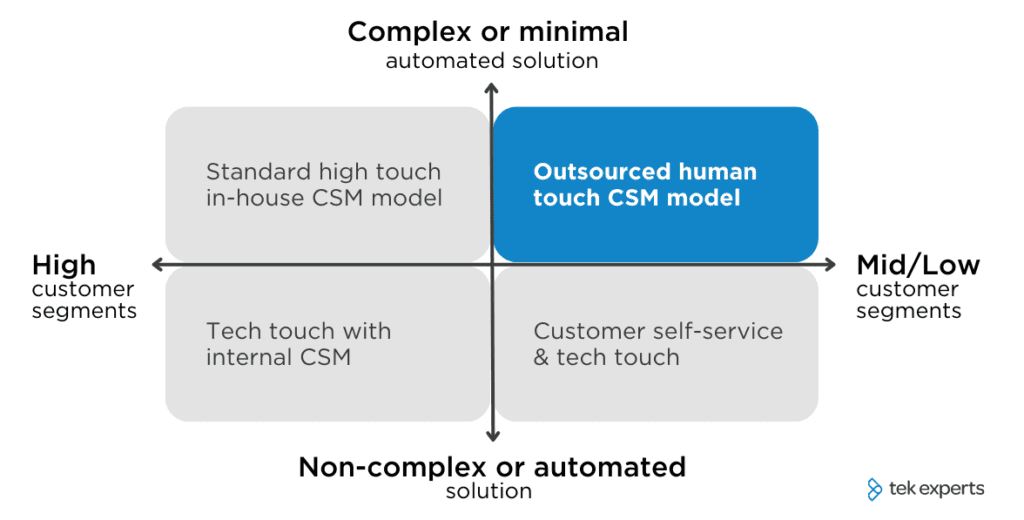
Outsourcing customer success is also a great fit for clients who may be able to afford internal teams but lack coverage in specific regions.
It can be difficult meeting language requirements without having customer success representatives in the same regions as your customers, and without being able to easily communicate, you lose the ability to build deep relationships with your customers.
Setting up new sites and hiring and training employees to fill those offices requires a lot of time and money, which many organizations don’t have. In these instances, a customer success partner with existing entities and employees in the regions you’re looking to serve can provide an exceptional advantage to your business.

“Having people that can speak your customers’ languages in their regions is powerful. We’ve supported customers in 52 different countries with 12 different languages that, because of language barriers, were neglected in the past.”
– David Mangham, Head of Global Customer Success at Tek Experts
Does a customer success partnership seem like a good fit for you? If you’re interested in learning more about how to drive revenue with less resources, reach out for a free consultation.
Frequently Asked Questions
Why is customer success important?
Customer success is important for the following reasons:
- Boosts customer retention: This in turn drives additional revenue.
- Builds customer advocacy and brand loyalty: Increases the chances of customers leaving positive reviews and recommending your services to others.
- Creates a competitive advantage: Stronger customer relationships will help to establish your company as a recognized and trusted partner.
- It improves internal efficiency: As customer success practices are built to be scalable, processes will start to be streamlined and resources optimized. It is likely that these improved processes can also be applied to other areas of your business.
Why should I scale customer success?
Alongside the obvious financial benefits, here are two key advantages to scaling customer success:
- Accommodating Growth: Successfully scaling customer success ensures that you can effectively support and meet the needs of an expanding customer base. Building this experience may help in expanding other areas of the business in the future.
- Retaining and Upselling Existing Customers: New resources, processes, and systems within a scalable customer success program can help to identify expansion opportunities for existing customers, helping to increase customer lifetime value, upsells and cross-sales, leading to revenue growth.
What are the main challenges for scaling customer success?
- Resource Allocation: Scaling customer success requires the allocation of sufficient resources, including personnel, technology, and infrastructure. It can be challenging to determine the optimal levels of staffing, training/onboarding of new team members and necessary technology needed to support a growing customer base.
- Standardization and Consistency: As customer success efforts scale, maintaining consistent service and experiences across a larger customer base becomes more challenging, especially when dealing with diverse customer segments, geographic locations, or complex product offerings.
- Knowledge Management: The scaling of customer success involves effectively managing knowledge and information related to customers, their preferences, interactions, and historical data. It can be difficult to find systems and processes that work for your business to securely capture, organize, and utilize customer information.
